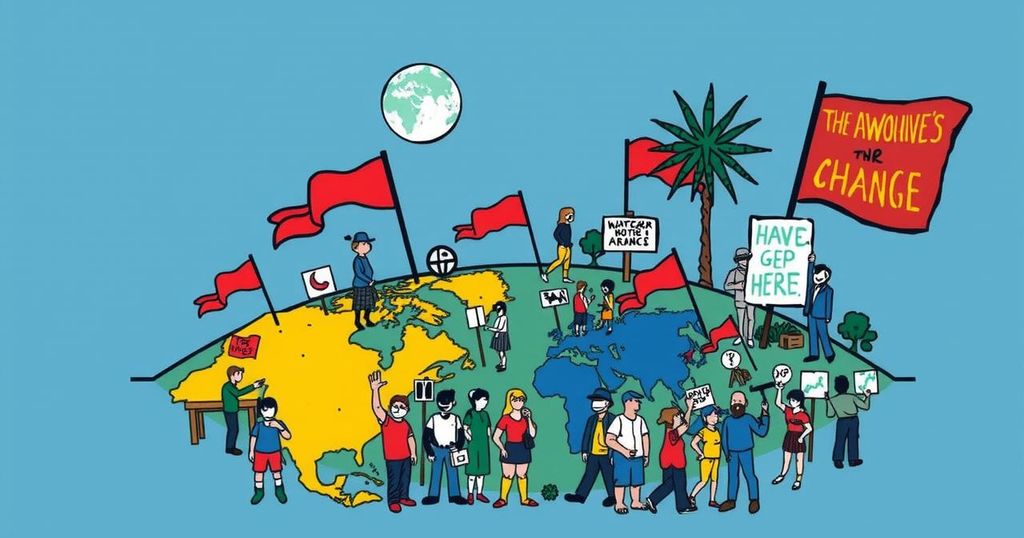Climate change
ASIA, AZERBAIJAN, BRAZIL, CHINA, CLIMATE CHANGE, CLIMATE JUSTICE, COPENHAGEN, DENMARK, ENVIRONMENTAL POLICY, EUROPE, FRANCE, GREENHOUSE GAS EMISSIONS, INDIA, INTERGOVERNMENTAL PANEL, INTERNATIONAL COOPERATION, IPCC, JAPAN, KYOTO, MEXICO, NORTH AMERICA, PARIS, PARIS AGREEMENT, RIO DE JANEIRO, SOUTH AMERICA, SPOKANE, UN, UNITED NATIONS, UNITED STATES, US
Marcus Li
0 Comments
Key Milestones in the Global Fight Against Climate Change
This article chronicles ten significant milestones in the global fight against climate change, highlighting efforts from the establishment of the IPCC in 1988 to the 2023 COP28 agreement to phase out fossil fuels. The narrative emphasizes key events such as the Kyoto Protocol, the Paris Agreement, and highlights influential figures like Greta Thunberg in shaping public engagement on climate action.
As the world prepares for the upcoming UN climate summit in Azerbaijan, it is crucial to reflect on pivotal moments in the history of climate action. In 1988, in response to emerging scientific evidence regarding rising global temperatures, the United Nations instituted the Intergovernmental Panel on Climate Change (IPCC). Two years later, the IPCC’s inaugural report highlighted the expected surge in greenhouse gases due to human activities, prompting an urgent call for action to mitigate their impact on Earth’s climate. The 1992 Earth Summit in Rio de Janeiro led to the formation of the UN Framework Convention on Climate Change (UNFCCC), aiming to adjust and reduce greenhouse gas emissions. Following this, the Kyoto Protocol was established in 1997, mandating developed nations to cut their emissions by an average of 5.2% within the early 2000s; however, developing countries were exempt from mandatory targets, a decision that sparked ongoing debate, especially after the United States declined to ratify the agreement. The IPCC reaffirmed the reality of climate change in 2007, stating that the evidence is now “unequivocal” and connected to an increase in extreme weather incidents. This year also saw the award of the Nobel Peace Prize to the IPCC and former U.S. Vice President Al Gore, recognizing their leadership in climate awareness. The 2009 COP15 in Copenhagen was marked by unmet expectations, as nations failed to secure a binding agreement for combating climate change beyond 2012. Nonetheless, a collective target to limit global temperature rises to two degrees Celsius was proposed by major emitters, lacking actionable commitments. Notable progress came in 2015 with the Paris Agreement, a landmark accord in which nearly all countries pledged to limit global warming significantly below two degrees Celsius, with a more ambitious goal set at 1.5 degrees Celsius. In 2018, Swedish environmental activist Greta Thunberg began her influential protests, encouraging youth worldwide to demand urgent climate action. Thunberg’s activism became a symbol of the growing climate movement, inspiring global youth protests. Further recognition of biodiversity loss occurred in December 2022, with an agreement in Montreal calling for the protection of 30% of Earth’s land and oceans by 2030 and an end to species extinctions driven by human activities. In 2023, the COP28 in Dubai resulted in a significant agreement aimed at phasing out fossil fuels, aptly described by EU climate chief Wopke Hoekstra as “the beginning of the end” for fossil fuel dependency, acknowledging the prolonged struggle over nearly three decades of climate negotiations. Looking ahead, 2024 has thus far recorded unprecedented global temperatures, with August 2024 marking an alarming average of 16.82 degrees Celsius, surpassing the critical threshold of 1.5 degrees Celsius. This alarming trend underscores the urgent need for continued global leadership and action against climate change.
The urgency to address climate change has escalated over the past several decades, with widespread scientific consensus highlighting the anthropogenic factors contributing to global warming. International collaboration has been central to the response strategies, exemplified by key global summits and agreements designed to manage emissions and mitigate climate impacts. Each significant date referenced reflects critical milestones in this ongoing struggle, showcasing both advancements and challenges faced in the quest for sustainable solutions.
The timeline of climate action underscores a complex journey marked by landmark agreements, formidable challenges, and pivotal advocacy efforts. As the upcoming UN climate summit approaches, it is imperative for global leaders to build upon these historical lessons to foster a cohesive and robust response to ongoing climate threats. The commitment to drastically reduce greenhouse gas emissions and protect biodiversity will be crucial in steering towards a sustainable future for the planet.
Original Source: www.fox28spokane.com




Post Comment